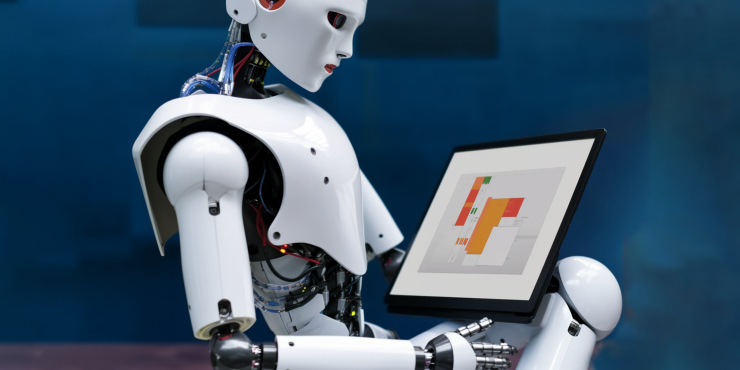Product Marketing Demystified: AI-Driven Strategies & Examples

In this digital age, the game of product marketing has become a dynamic dance of data and innovation. Picture this: Your product is soaring to new heights. And it's fueled by more than just your instincts. Advanced AI intelligence is also coming into play to do product management marketing.
Now, fasten your seat belts. We're going to reveal the secrets of marketing AI-based products. No jargon, no complicated theories. We'll use research on how AI is revolutionizing the way we draw attention to products and conquer markets. From personalized recommendations to predictive analytics. We'll walk you through examples demonstrating AI's prowess in expanding reach and influence. Say goodbye to the mysteries of marketing and join us. You'll be able to decipher the language of success in the age of AI-driven strategies!
Understanding Product Marketing and Management
Product marketing consists of promoting and selling the product to clients. It focuses on developing an engaging product message. That is, it establishes the target audience and device strategies. These are the tactics you employ to increase product awareness. As a result, it contributes to increased sales.
On the other hand, product management controls the entire product life cycle. It includes product development, planning, and ensuring the product meets customers' needs. Product managers collaborate with various teams to create a successful product. In brief, comparing product marketing vs product management then:
- Product marketing is introducing the product to the world
- Product management ensures the product's success from conception to market launch.
The key differences lie in their focus: product marketing is about promotion, and product management is about development and strategy. Nevertheless, they are interrelated. Therefore, effective communication between the two is critical to the product's success.
Synergy occurs when product managers and marketers work cohesively. They align product features with customer desires.
AI integration increases performance in both domains. In product marketing, artificial intelligence aids in the analysis of consumer data. It improves marketing targeting. AI aids product management by forecasting demand. It helps to optimize development processes.
In short, product marketing promotes the product, while product management assures its success. They have diverse characteristics yet are interdependent. And it is AI that enhances efficiency in these domains, resulting in the best outcomes.
The Significance of Product Marketing in Today’s Market
At times, one may question the justification for engaging in product promotion. Well, the answer is within our reach! In today's corporate world, product marketing is the key to success. It is critical for connecting products and customers. Let's look at the importance of product marketing and how artificial intelligence improves success. Thus, the following explanation sheds light on the important grounds emphasizing the importance of product marketing:
- Visibility and recognition. Product marketing ensures your product is not just a face in the crowd. It will definitely stand out, gaining recognition in an oversaturated market.
- Value articulation. It creates a compelling narrative about your product. You can form a unique value proposition for customers.
Also, remember that Artificial Intelligence plays a particular importance too. So, how AI works in improving product marketing:
- Data analysis. AI is extremely fast at evaluating large amounts of data. It gives marketers crucial information about client behavior and market trends.
- Precision targeting. With the help of AI, product marketing becomes more precise. It allows companies to tailor messages to specific demographics and segments.
- Competitive advantage. AI allows marketers to stay ahead of the competition. It predicts trends and recommends strategies to match the ever-changing market landscape.
There is also the impact of AI-based product marketing on customer engagement and sales. Let's take a closer look:
- Personalization. AI-based personalization ensures that customers receive content tailored to their preferences. It enhances the overall customer experience.
- Proactive anticipation. The predictive capabilities of AI allow companies to anticipate customer needs. It enables them to proactively solve problems and stay ahead in the market.
- Conversion optimization. The result is not only increased engagement but also higher conversion rates. It leads to a tangible increase in sales.
In a rapidly changing world, the fusion of product marketing and AI is becoming a powerful formula. You build sustainable business growth by ensuring that products make a lasting impact.
Best Product Marketing Examples in the AI Era

There are numerous outstanding instances of product marketing in the AI era. They have shown the transforming impact of artificial intelligence in attaining success. Let's have a look at these cases, grasp how AI works, and draw conclusions.
| Spotify's personalized recommendations | AI implementation. Spotify uses artificial intelligence algorithms to analyze users' listening habits. It generates personalized playlists and song recommendations. Result. This approach has significantly increased user engagement and retention. It has demonstrated the effectiveness of personalized content delivery. |
| Amazon product recommendations | AI implementation. Amazon employs machine learning algorithms to examine purchasing history and customer behavior. It provides individualized product suggestions. Result. The use of recommendations has contributed to an increase in sales and customer satisfaction. |
| Chatbots in customer service (various industries) | AI implementation. Various companies in different industries are implementing AI-based chatbots. Customer support needs to provide instant answers and solutions. Results. Increased customer satisfaction, reduced response times, and operational cost savings. It has been a notable result of integrating AI-based chatbots. |
These examples highlight the synergy between product marketing vs product management and AI. They emphasize the need for companies to employ data-driven strategies. It will help achieve optimal results in a competitive environment.
Practical Insights - AI in Action
Identifying and targeting the right product markets is a critical challenge in the dynamic landscape of product management marketing. Let's look at real-world scenarios. This is where AI has demonstrated its mastery of these data-driven challenges.
- Personalization in e-commerce:
- Scenario. Consider a global e-commerce giant looking to personalize the user experience. Traditional methods failed to understand the different preferences of shoppers in different regions.
- AI-based solution. Humans use AI algorithms to analyze user behavior, purchase history, and demographic data. The system dynamically adjusted product recommendations based on individual preferences.
- Data-driven effectiveness. We got a noticeable increase in conversions by 25%. And the artificial intelligence system adapted to changing trends and customer preferences. And it did it in real-time.
- Mobile app user engagement:
- Scenario. A mobile app developer sought to increase user engagement. But it was doing so in a highly competitive environment. Identifying key user segments and their preferences was a challenge.
- AI-based solution. The developers implemented machine learning models. It allowed them to analyze in-app behavior, create user profiles, and predict their preferences. Push notifications were personalized using AI insights.
- Data-driven effectiveness. User engagement increased by 30%, and app retention rates increased by 20%. It demonstrates the impact of AI in delivering targeted and relevant content.
- Market expansion in the automotive industry:
- Scenario. A leading automobile manufacturer was looking to expand the scope of product management marketing. However, it faced challenges in identifying potential customer segments in new regions.
- AI-based solution. The manufacturer used artificial intelligence tools to analyze socio-economic data. It also analyzed local market trends and consumer behavior in potential expansion regions. Predictive models identified segments with high levels of purchase intent.
- Data-driven effectiveness. Market expansion efforts resulted in a 15% increase in sales in target regions. It validates the success of AI-assisted market identification.
- Health and wellness product launch:
- Scenario. A health and wellness company was planning to launch a new product. However, it needed to identify the right target audience among the diverse interests of consumers.
- AI solution. The company used natural language processing (NLP) algorithms to analyze social media discussions. They collected reviews and read online forums to determine consumer sentiment and preference.
- Data-driven effectiveness. The product achieved market penetration 20% higher than expected. It demonstrates the effectiveness of AI in understanding the nuances of consumer preferences.
In these real-world scenarios, AI has proven what is an example of a product market. The effectiveness of AI-based solutions is evident in the significant:
- Increased conversions
- User engagement
- Successful market expansion
- Product launch
- Cross-sell revenue
The main takeaway is apparent! Data-driven AI insights are crucial for navigating the complexity of the market.
Conclusion
AI serves as a driving force in the ever-changing world of product marketing. It simplifies difficulties and achieves real outcomes. Real-world events highlight AI's transformational capability. As businesses negotiate the changing economy, the usage of AI becomes critical. Learn about the power of newo.ai products for effective and long-lasting AI solutions. Improve your product promotion and seize the future of success!


